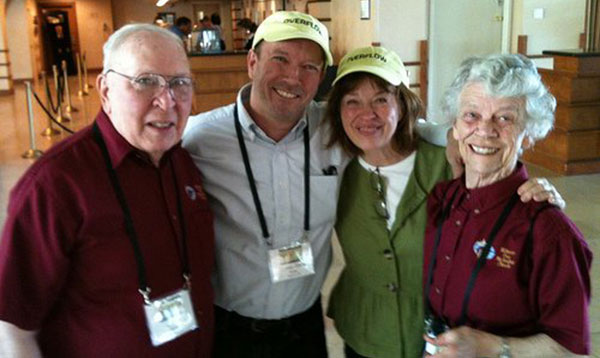Bishop David Roller
Master of Divinity, Asbury Theological Seminary, 1980.
Last updated: September 25, 2019

At first, Bishop David Roller felt like he drew the short straw when he was assigned to lead the Recalibrate Initiative in the Free Methodist Church. Admittedly, he wanted to focus on places with obvious potential instead of the places with problems. After re-framing his outlook, he realized that resources abound in these churches. Currently, he’s working with congregations to help them re-think, re-align and re-launch their mission, vision and values.
“I thought, ‘Wow! If we could figure this out, this is a great opportunity,’” Bishop Roller, Free Methodist Bishop of North America, said. “I know how hard it is to plant a new church, but we already have people, buildings and money. Why don’t we pay attention to these places and people?”
The Free Methodist Church is more than 150 years old and reports that 51 percent of its churches are stagnant or in decline. However, 31 churches are currently participating in the Recalibrate Initiative. The goal is to create a church that is not just for the people on the inside, but the people on the outside, too.
“I don’t care about the churches, the statistics, the being able to say, ‘We have a church in such and such a place,’” Bishop Roller said. “It’s all about the individuals to me. It’s all about those inside and outside. I want the people in these churches to effectively reach the communities with the good news of Jesus.”
The Recalibrate Initiative is an 18-month process. Churches apply to join and are assigned a regional coach. It’s vital that the pastor develops a renewed, specific vision for the church. Then the staff and lay-leaders come together to develop strategies to implement the vision, and seven months later, re-launch the church through facility and program changes.
At its heart though, the Recalibrate Initiative is not a system, it is a prayer-filled and spirit-led renewal effort.
“Recalibrate is an intentional spirit-filled system for helping churches enter a new period of fruitfulness,” Bishop Roller said.

Bishop Roller believes that these changes allow the congregation to see the world with what he calls “missionary eyes.” When a missionary travels to a foreign land, he or she spends time studying the culture and customs. So, too, participants in this initiative spend time studying their communities.
“Just like a doctor would pay attention to what the patient says hurts, so we should pay attention to what the culture says hurts and present the Good News to address that pain,” Bishop Roller said.
For example, instead of directly addressing the need for forgiveness of sins, Bishop Roller suggests that churches address broken relationships. As demonstrated in families and politics, the need for reconciliation runs deep.
“People do still need forgiveness,” he said. “I’m not debating theology, but I am debating communication. The story of Jesus is not just about the forgiveness of sins. If you look at the way Jesus talked about the Kingdom of God, it does include forgiveness of sins, but it also includes family and society.”
Bishop Roller is challenging those he leads to be sensitive to the problems the culture senses and speak the story of Jesus in a way that is meaningful to the culture. Although it’s too early for qualitative data, since the initiative’s launch in January 2017, the response from churches and pastors has been very supportive.
“Recalibrate is helping churches be re-born,” Bishop Roller said. “People today have the passion of those who founded that church.”
Bishop Roller and JJ Shimko, current D.Min. student, are working together to analyze and refine the system. You can read more about JJ’s story on our Voices page.

Prepare for the Call
Learn more about how Asbury Seminary can help prepare you for your call. Fill out the form below to get started!





